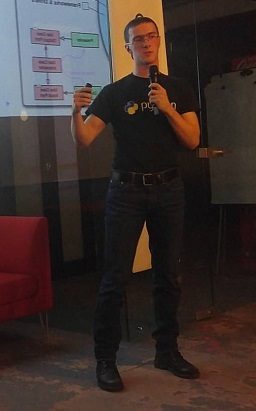Interview with Artyom Malyshev, who will speak at Moscow Python in October
 There are a lot of IT conferences in Moscow. If you go to each - you can only do it and do it. Introvert developers do not like to go to conferences: who all these people are, why the reports are either uninteresting or for one and a half narrow specialists, I still don’t know anything new, and so on. But go. Because the conference is a unique opportunity to communicate with the same developers who gathered in one place specifically for this. And not to miss, we focus on the reports.
There are a lot of IT conferences in Moscow. If you go to each - you can only do it and do it. Introvert developers do not like to go to conferences: who all these people are, why the reports are either uninteresting or for one and a half narrow specialists, I still don’t know anything new, and so on. But go. Because the conference is a unique opportunity to communicate with the same developers who gathered in one place specifically for this. And not to miss, we focus on the reports.If the report touches upon an interesting topic for us, then it will be possible to talk with the speaker and other guests who came to this report. Chances are good that they came for a reason, and they are also interested in the topic. Well, in order not to miss at all, the organizers of some conferences a month before the start do a series of interviews with speakers, where they are asked various tricky questions. So that those who are interested in the stated topics can evaluate: whether they want to communicate with the speaker and other listeners.
Last week I interviewed Ivan from Positive Technologies, who in a little more than a month will tell us why a 100% test coverage is bad. And today I invite you to read the answers of his colleague Artem Malyshev, who will tell us about the Django Channels. A thing that will no longer require every second project to start with the deployment and configuration of Celery.
What did you do as a developer? What companies, tasks, programming languages and technologies? Where are you using Python now?
')
I began my career at a military factory as a Delphi programmer. After that, I went through a rather ornate way of programming the microprocessors from Milander, supported several workflow systems and tried my hand at Web development. The languages were also very diverse: Haskell, Clojure, Java, Ruby, C. This is from what I tried in production :) Well, Python is naturally the coolest. Now I build on it distributed systems in the company of Positive Technologies. We are engaged in computer security and python is used by many of our products.
In your experience, what are the strengths and weaknesses of Python in relation to other mainstream programming languages in your area?
Of course, the strengths of the language are a developed ecosystem, a friendly community and a low threshold for entry. Of the minuses probably weak features in graphical interfaces. Personally, I have high hopes for the BeeWare project.
If you could go back in time when Guido created Python and give him one, but any advice - what would you say?
In general, I do not think that I have something to advise Guido. All decisions made by him were balanced and fit perfectly into the realities of the time. If which ones don't seem appropriate now, it’s just because those times are over. This is the natural flow of things.
What do you use to write and edit Python code?
Only Emacs! Only hardcore!
Let's play Nostradamus. What do you think will happen to Python in a few years?
All popular libraries and frameworks will cut down Python 2 support. Yura Selivanov will smother asynchronous generators in the master. PyPy learns how to run code with coroutines.
What do you think about switching from Python 2 to Python 3? Anything interesting that you personally encountered in practice?
In my open source projects, I support the version of python from 2.6 to 3.5. This is not so difficult from the point of view of the runtime language, but errors in the standard library are fixed in new versions and not fixed in old ones sometimes saddened. In any case, new projects need to do in Python 3.
What one advice would you give to all new Python developers?
Do not immediately rush to the development of large frameworks such as Django or SQLAlchemy. First, deal with the language itself. Well, and this ... Lutsa does not read in any case.
In which programming language do you write at work other than python? And outside of work?
Elisp. For money :)
Recommend any book that you have read over the past year, technical or not.
Finally read python reference :)
Many people think that it is best to start learning programming in Python. Your opinion?
I think it's better to start with C and computer architecture as a whole. At 16, I really liked to rearrange the Baitikas.
From the interviewer
Before the conference, I plan to do some more interviews with the same set of questions. If you have tricky questions for the speakers, the answers to which it is interesting for Habrazhitelems to write - write in the comments. I accept applications for reports until mid-September (for a month to prepare a report). You can write to me in lichku, facebook or leave a request on the conference website .
Source: https://habr.com/ru/post/309168/
All Articles